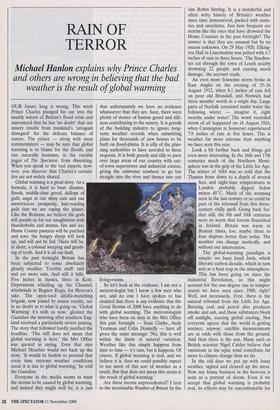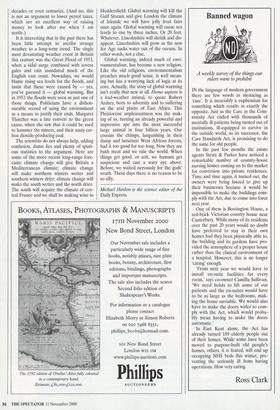RAIN OF TERROR
Michael Hanlon explains why Prince Charles
and others are wrong in believing that the bad weather is the result of global warming
OUR future king is wrong. This week Prince Charles plunged his oar into the muddy waters of Britain's flood crisis and announced that he has `no doubt' that our misery results from mankind's 'arrogant disregard' for the delicate balance of nature. The prince — along with most commentators — may be sure that global warming is to blame for the floods; and one naturally hesitates, in the royalist pages of The Spectator, from dissenting. When you speak to the real experts, how- ever, you discover that Charles's certain- ties are not widely shared.
Global warming is a great story. As a formula, it is hard to beat: disaster, floods, middle-class greed, dollops of guilt, angst at our shiny cars and our meretricious prosperity, hair-rending guilt that we are raping the planet. Like the Romans, we believe the gods will punish us for our naughtiness with thunderbolts and storms, fire and ice; Home County pastures will be parched and sore; the hungry sheep will look up, and will not be fed. There will be, in short, a colossal weeping and gnash- ing of teeth. And it is all our fault.
In the past fortnight Britain has been subjected to some absolutely ghastly weather. Terrible stuff: rain and yet more rain. And still it falls. Five inches in Sussex, three in Kent. Depressions whistling up the Channel, whirlwinds in Bognor Regis, for Heaven's sake. The open-toed alfalfa-munching brigade, now joined by senior royalty, are in no doubt as to what is going on. 'Global Warming: it's with us now,' gloated the Guardian the morning after southern Eng- land received a particularly severe pasting. The story that followed hardly justified the headline. 'This still does not mean that global warming is here,' the Met Office was quoted as saying. Even that nice Michael Meacher would not back up the story. 'It would be foolish to pretend that every time extreme weather conditions occur it is due to global warming,' he told the Guardian.
Everyone in the media seems to want the storms to be caused by global warming, and indeed they might well be; it is just that unfortunately we have no evidence whatsoever that they are. Sure, there were plenty of stories of human greed and silli- ness contributing to the misery. It is greedy of the building industry to ignore long- term weather records when submitting plans for thousands of new homes to be built on flood-plains. It is silly of the plan- ning authorities to have acceded to these requests. It is both greedy and silly to pave over large areas of our country with out- of-town superstores and industrial estates, giving the rainwater nowhere to go but straight into the river and thence into our
living-rooms.
So let's look at the evidence. I am not a meteorologist but I know a few men who are, and no one I have spoken to has claimed that there is any evidence that the Great Storms of 2000 have anything to do with global warming. The meteorologists who have been on duty at the Met Office this past fortnight — Sean Clarke, Andy Yeatman and Colin Donnelly — have all given the same message: 'No, this is well within the limits of natural variation. Weather like this simply happens from time to time — it's rare, but it happens. Of course, if global warming is real, and we believe it is, then we could possibly expect to see more of this sort of weather as a result. But that does not mean this storm is the result of global warming.'
Are these storms unprecedented? I turn to the inestimable Weather of Britain by the late Robin Stirling. It is a wonderful and often witty history of Britain's weather since time immemorial, packed with statis- tics and anecdotes. Just how frequent are storms like the ones that have drowned the Home Counties in the past fortnight? The answer is that they are unusual but by no means unknown. On 29 May 1920, Elking- ton Hall in Lincolnshire was pelted with 4.7 inches of rain in three hours. 'The floodwa- ter cut through the town of Louth nearby drowning 22 people and causing much damage,' the account reads.
An even more fearsome storm broke in East Anglia on the evening of 25-26 August 1912, when 8.1 inches of rain fell on poor old Brundall, and Norwich had three months' worth in a single day. Large parts of Norfolk remained under water the following winter — imagine it, eight months under water! The worst recorded storm of all happened on 18 August 1924, when Cannington in Somerset experienced 7.9 inches of rain in five hours. This is weather far more extreme than anything we have seen this year.
Look a bit further back and things get even more interesting. In the 16th and 17th centuries much of the Northern Hemi- sphere was in the grip of the Little Ice Age. The winter of 1684 was so cold that the Thames froze down to a depth of several feet, and night-time temperatures in London probably dipped below minus 40°C. Much of the warming seen in the last century or so could be part of the rebound from this three- century chilly spell. Going back fur- ther still, the 9th and 10th centuries were so warm that forests flourished in Iceland. Britain was warm in Roman times, too, maybe three to four degrees hotter than today. The weather can change markedly, and without our intervention.
The global-warming paradigm is simple: we burn fossil fuels, which liberate carbon dioxide, which in turn acts as a heat trap in the atmosphere. This has been going on since the Industrial Revolution, so this might account for the one-degree rise in temper- atures we have seen since 1900, right? Well, not necessarily. First, there is the natural rebound from the Little Ice Age. Burning coal and petrol also produces smoke and ash, and these substances block off sunlight, causing global cooling. Not everyone agrees that the world is getting warmer, anyway: satellite measurements are at odds with those from the ground. And then there is the sun. Many such as British scientist Nigel Calder believe that variations in the solar wind contribute far more to climate change than we do.
In the old days we put up with lousy weather, sighed and cleared up the mess. Now any funny business in the heavens is seen as a portent of doom. Even if we accept that global warming is probably real, its effects may be unconfirmable for decades or even centuries. (And no, this is not an argument to lower petrol taxes, which are an excellent way of raising money to look after me when I am senile.) It is interesting that in the past there has been little attempt to ascribe strange weather to a long-term trend. The single most devastating weather event in Britain this century was the Great Flood of 1953, when a tidal surge combined with severe gales and rain inundated much of the English east coast. Nowadays, we would blame rising sea levels for the floods, and insist that these were caused by — yes, you've guessed it — global warming. But in 1953 the floods were seen as just one of those things. Politicians have a dishon- ourable record of using the environment as a means to justify their ends. Margaret Thatcher was a late convert to the green cause, when she saw that it could be used to hammer the miners, and their nasty car- bon dioxide-producing coal.
The scientists do not always help, adding confusion, damn lies and plenty of spuri- ous statistics to the argument. Here are some of the more recent long-range fore- casts: climate change will give Britain a Mediterranean climate; climate change will make northern winters wetter and southern winters drier; climate change will make the south wetter and the north drier. The south will acquire the climate of cen- tral France and we shall be making wine in Huddersfield. Global warming will kill the Gulf Stream and give London the climate of Irkutsk; we will have jolly frost fairs once again. Global warming will cause sea levels to rise by three inches. Or 20 feet, Whatever. Lincolnshire will shrink and dis- appear. Lincolnshire will grow as the new Ice Age sucks water out of the oceans. In other words, not a clue.
Global warming, indeed much of envi- ronmentalism, has become a new religion. Like the old religions, environmentalism preaches much good sense, is well mean- ing but has a worrying lack of logic at its core. Actually, the story of global warming isn't really that new at all. Honto sapiens is a bad-weather animal, to quote Robert Ardrey, born to adversity and to suffering on the arid plains of East Africa. This Pleistocene unpleasantness was the mak- ing of us, turning an already powerful and impressive ape into the most successful large animal in four billion years. Our cousins the chimps, languishing in their damp and luxuriant West African forests, had it too good for too long. Now they are bush meat and we rule the world. When things get good, or soft, we humans get suspicious and cast a wary eye above. Before, we waited nervously for the gods' wrath. These days there is no reason to be so silly.
Michael Hanlon is the science editor of the Daily Express.



























































































 Previous page
Previous page